-
ORIGINAL ARTICLE10-17-2022
Coping with the health condition from the perspective of people with HIV who abandoned treatment
Revista Brasileira de Enfermagem. 2022;75:e20210958
Abstract
ORIGINAL ARTICLECoping with the health condition from the perspective of people with HIV who abandoned treatment
Revista Brasileira de Enfermagem. 2022;75:e20210958
DOI 10.1590/0034-7167-2021-0958
Views0See moreABSTRACT
Objectives:
to understand how people living with HIV who have abandoned treatment face their health condition.
Methods:
a qualitative study, based on the Chronic Care Model theoretical precepts. Data were collected between April and August 2021, through interviews with 24 people registered in a specialized service in the Brazilian Midwest.
Results:
coping with the health condition included good and bad moments and is influenced by individual behaviors and the way in which the network was organized. Treatment abandonment was motivated by the absence of signs and symptoms, the way care is provided and medication side effects.
Final Considerations:
care actions focusing on behavior change and maintenance become necessary in order to favor continuity of treatment. Furthermore, the gaps identified in the way health services are organized are subject to intervention.
-
ORIGINAL ARTICLE10-07-2022
Construction and validation of a serial album for companions of patients with stroke
Revista Brasileira de Enfermagem. 2022;75(4):e20210843
Abstract
ORIGINAL ARTICLEConstruction and validation of a serial album for companions of patients with stroke
Revista Brasileira de Enfermagem. 2022;75(4):e20210843
DOI 10.1590/0034-7167-2021-0843
Views0See moreABSTRACT
Objectives:
to construct and validate a serial album, to be used in hospital discharge planning of patients with stroke.
Methods:
a methodological study, with construction of a serial album, validity by 22 judges and assessment by 22 companions. Data were collected from the Health Education Content Validity Instrument, with the companions, from the Suitability Assessment of Materials.
Results:
the serial album has 21 pages. The overall Content Validity Index was equal to 0.87 among expert judges and 1.0 among companions.
Conclusions:
the educational technology constructed was considered valid by the judges and assessed as understandable by the companions so that it presented itself as a viable technological resource for use in the health education of companions of patients with stroke.
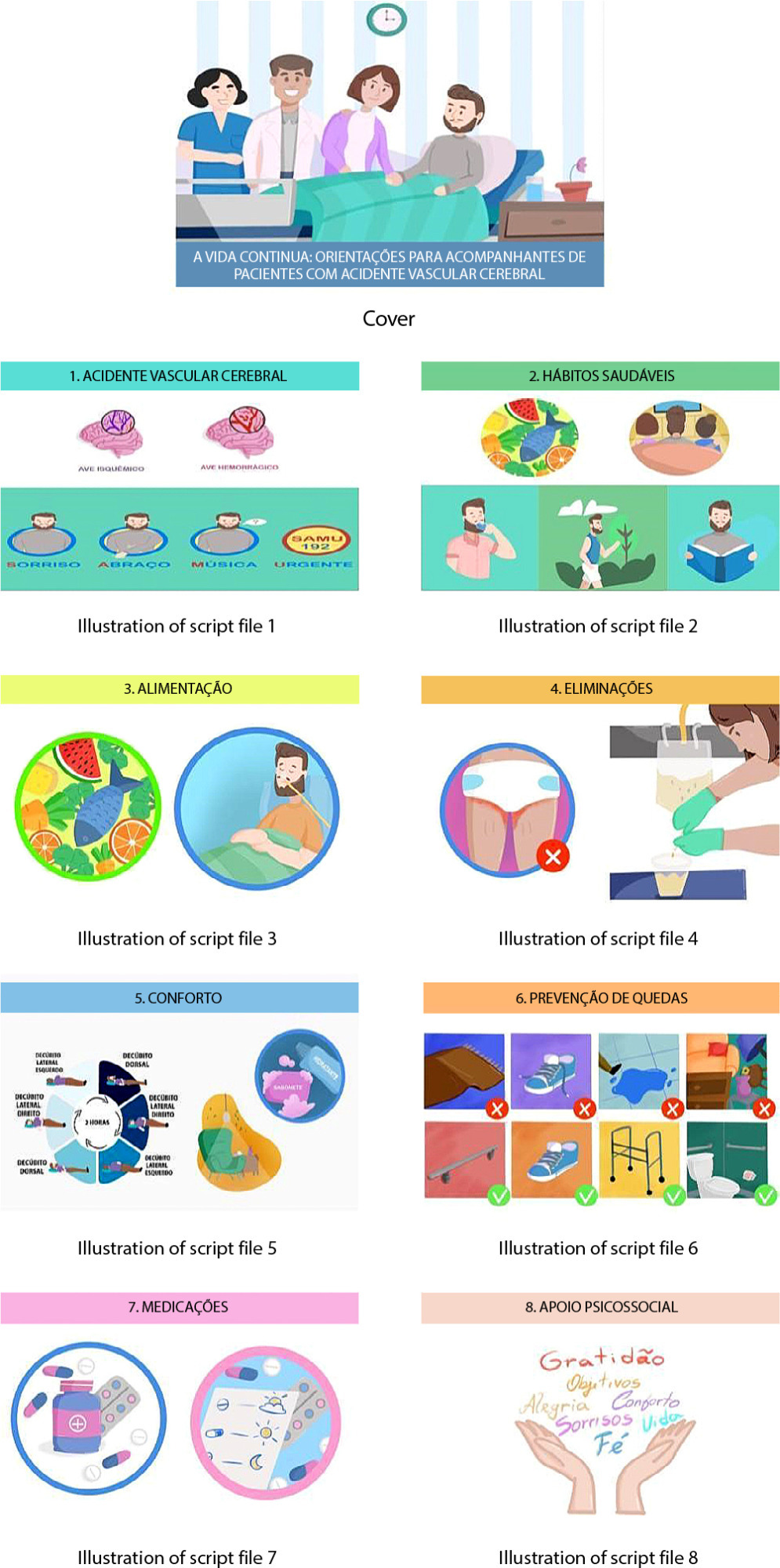
-
REVIEW10-07-2022
Strategies for thirst management in postoperative adult patients: a scoping review
Revista Brasileira de Enfermagem. 2022;75(4):e20220154
Abstract
REVIEWStrategies for thirst management in postoperative adult patients: a scoping review
Revista Brasileira de Enfermagem. 2022;75(4):e20220154
DOI 10.1590/0034-7167-2022-0154
Views0See moreABSTRACT
Objectives:
to map the strategies for managing thirst in postoperative adult patients.
Methods:
scoping review was conducted in October 2021 in 19 data sources: 14 databases and 5 platforms to search in the grey literature. It was prepared according to the recommendations of the Joanna Briggs Institute and the checklist of the Preferred Reporting Items for Systematic reviews and Meta-Analyses extension for Scoping Reviews. Nine selected articles were part of the final sample.
Results:
there is evidence of strategies to manage postoperative thirst using interventions such as water, ice, mentholated measures, carbohydrate and protein enriched fluid, oral hydrator, flavored gargling, cold gargling, wet gauze, 0.75% citric acid spray, and cold water.
Final Considerations:
the strategies observed may be reduced to cold and menthol use, salivary stimulants, and early introduction of fluids. The outcomes were positive in all the studies reviewed.
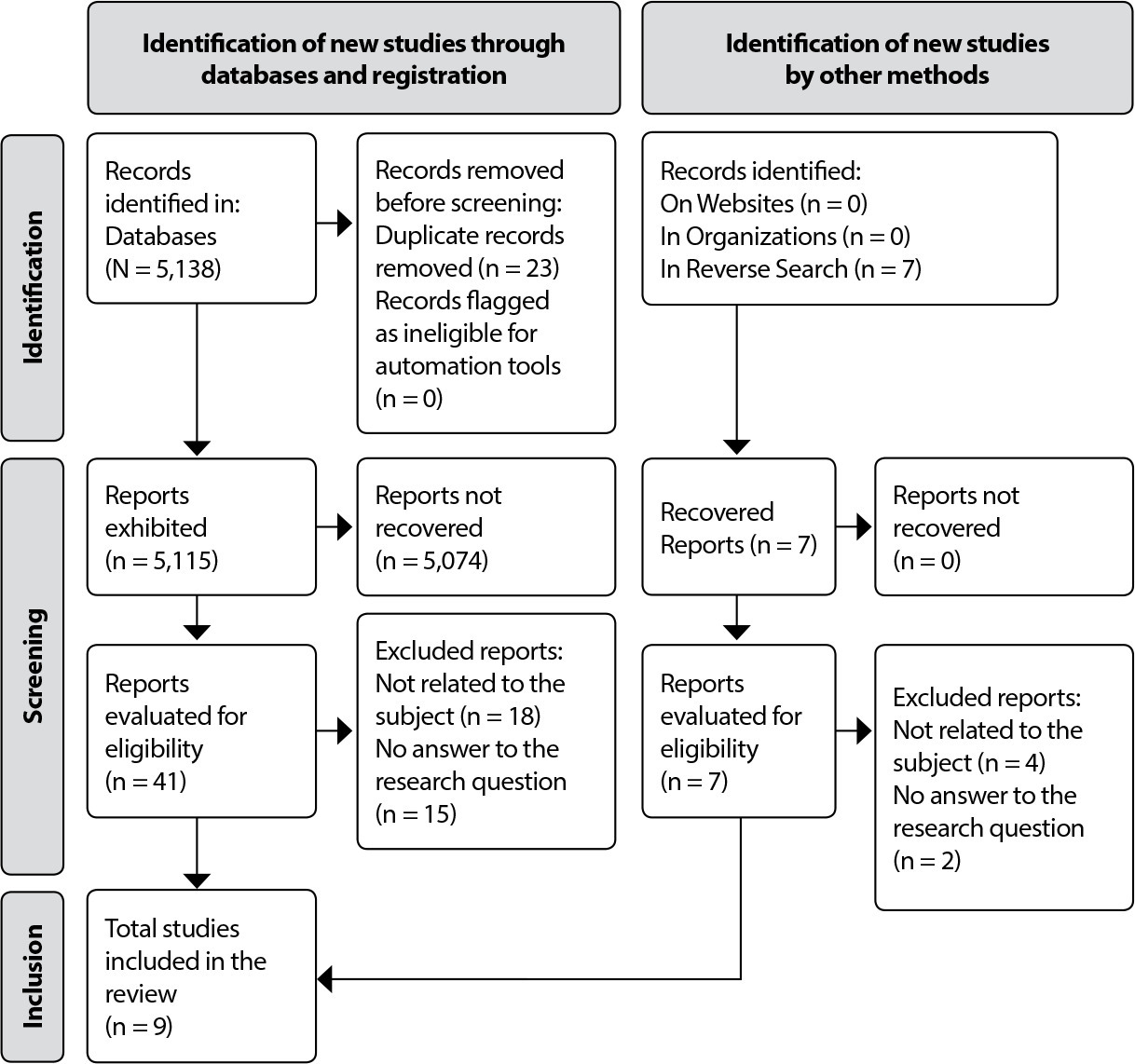
-
ORIGINAL ARTICLE10-07-2022
Perception of men perpetrators of violence about paternity
Revista Brasileira de Enfermagem. 2022;75(4):e20210890
Abstract
ORIGINAL ARTICLEPerception of men perpetrators of violence about paternity
Revista Brasileira de Enfermagem. 2022;75(4):e20210890
DOI 10.1590/0034-7167-2021-0890
Views0See moreABSTRACT
Objectives:
to learn about the perception of men in the judicial process due to spousal violence about paternity.
Methods:
a descriptive, qualitative study with nine men in the judicial process due to spousal violence. Data were collected through interviews; the men validated the data, which were systematized by the categorical thematic content analysis, and analyzed in light of scientific texts that discuss the subject.
Results:
the study allowed the creation of three categories: the father is the example for the son; the father must provide for the son’s needs; the father corrects the son.
Conclusions:
that context reveals the need to re-signify paternity to influence children’s education positively.
-
ORIGINAL ARTICLE10-07-2022
Nursing workload associated with neonatal mortality risk: a cross-sectional study
Revista Brasileira de Enfermagem. 2022;75(4):e20200965
Abstract
ORIGINAL ARTICLENursing workload associated with neonatal mortality risk: a cross-sectional study
Revista Brasileira de Enfermagem. 2022;75(4):e20200965
DOI 10.1590/0034-7167-2020-0965
Views0See moreABSTRACT
Objectives:
to analyze the association between nursing workload and neonatal mortality risk in newborns admitted to the Neonatal Intensive Care Unit.
Methods:
this is an observational, cross-sectional study conducted from January 2019 to January 2020.
Results:
the sample consisted of 399 newborns, 55.4% male, Nursing Activities Score mean of 67.5%, and Score for Neonatal Acute Physiology Perinatal Extension mean of 17.7, revealed itself as a predictor of the risk of death, while gestational age, length of hospitalization, and the first-minute Apgar established a protective relationship. The correlation between workload and neonatal mortality was low (r= 0.23, p=0.0009).
Conclusions:
the workload of the nursing team is not associated with the risk of mortality in the Neonatal Intensive Care Unit, as measured by the Nursing Activities Score.
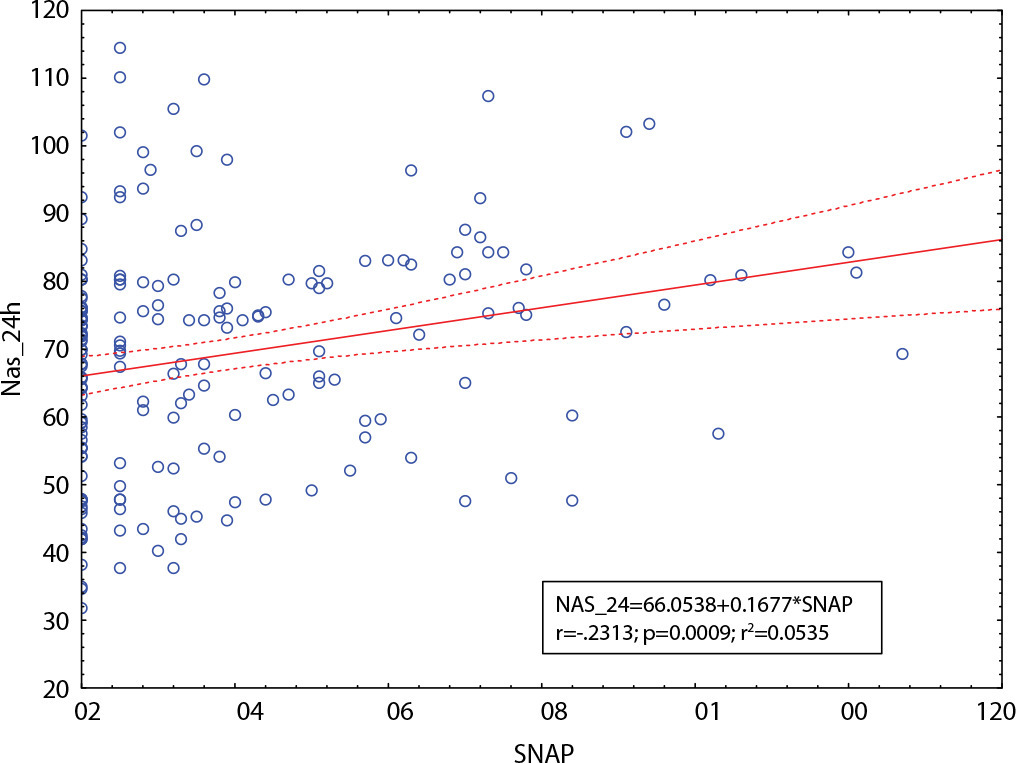
-
ORIGINAL ARTICLE10-07-2022
Violence against nursing workers: repercussions on patient access and safety
Revista Brasileira de Enfermagem. 2022;75(4):e20210765
Abstract
ORIGINAL ARTICLEViolence against nursing workers: repercussions on patient access and safety
Revista Brasileira de Enfermagem. 2022;75(4):e20210765
DOI 10.1590/0034-7167-2021-0765
Views1See moreABSTRACT
Objectives:
to analyze the repercussions of violence against nursing professionals, in the access and safety of patients in Family Health Strategy.
Methods:
a mixed study, with 169 nursing professionals. We used a socio-labor questionnaire, Survey Questionnaire Workplace Violence in the Health Sector, a patient safety instrument and interviews.
Results:
verbal aggression was related to support (p=0.048), respect (p=0.021), hours of care (p=0.047) and patient safety behaviors (p=0.033) among professionals. Suffering from bullying was related to fear of questioning when something is wrong (p=0.010) and lack of support from management (p=0.016). Victims of physical violence felt that their mistakes could be used against them. Mixed data converge and confirm that violence affects professional behavior and puts Primary Health Care attributes at risk.
Conclusions:
violence affects workers’ behavior, interferes with the care provided, weakens the access and safety of patients.
-
REVIEW10-03-2022
Intravenous therapy device labeling in Intensive Care Units: an integrative review
Revista Brasileira de Enfermagem. 2022;75(6):e20220049
Abstract
REVIEWIntravenous therapy device labeling in Intensive Care Units: an integrative review
Revista Brasileira de Enfermagem. 2022;75(6):e20220049
DOI 10.1590/0034-7167-2022-0049
Views0See moreABSTRACT
Objectives:
to synthesize the evidence on intravenous device labeling used to identify medications administered to patients in Intensive Care Units, with a view to preventing medication errors.
Methods:
an integrative review, in the LILACS, IBECS, Embase, MEDLINE, Scopus, Web of Science and CINAHL databases, from November to December 2021, using descriptors and selection criteria. Data were collected in 11 articles and subsequently classified, summarized and aggregated.
Results:
pre-designed labels, with pre-defined colors and information, help to prevent medication identification errors. There is still a lack of standardization in the practice of labeling syringes, intravenous lines, infusion pumps and saline solution bags. There are errors related to the lack of labeling devices or to their performance with incomplete information.
Conclusions:
device labeling is a barrier to defending the medication system safety and should be standardized.
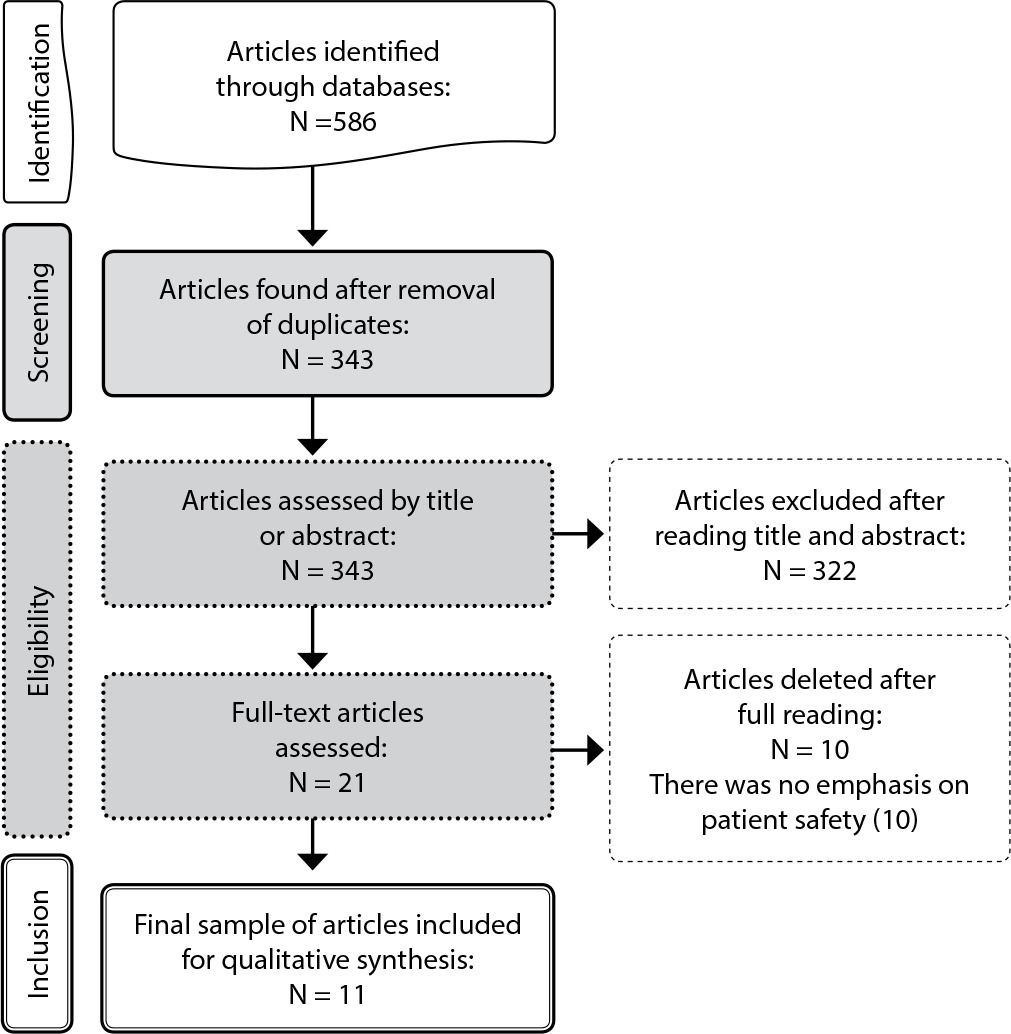
-
ORIGINAL ARTICLE10-03-2022
Evaluation of respiratory complications in a cohort of preterm infants who did not receive palivizumab monoclonal antibodies
Revista Brasileira de Enfermagem. 2022;75(6):e20210362
Abstract
ORIGINAL ARTICLEEvaluation of respiratory complications in a cohort of preterm infants who did not receive palivizumab monoclonal antibodies
Revista Brasileira de Enfermagem. 2022;75(6):e20210362
DOI 10.1590/0034-7167-2021-0362
Views0See moreABSTRACT
Objectives:
to analyze the occurrence of respiratory complications over the first year of life in preterm infants who did not receive palivizumab monoclonal antibodies.
Methods:
analytical retrospective cohort study with preterm infants born between 2012 and 2016 in Uberlândia, state of Minas Gerais, Brazil. Data collection occurred from January to November 2018, by consulting hospital and primary healthcare medical records. Data were processed with the Poisson regression model, with p<0.05.
Results:
of a total of 5,213 preterm births, 504 (9.7%) met the inclusion criteria. The preterm infants in this subset were assisted 2,899 times in primary care, which resulted in 1,098 (37.5%) medical diagnoses, of which 803 (78.5%) involved the respiratory tract. Preterm babies fed on formula milk at hospital discharge had more diagnoses of respiratory diseases. Maternal age (p=0.039), respiratory diagnosis at hospital discharge (p=0.028), and number of sporadic appointments (p<0.001) showed a significant association with bronchiolitis; number of sporadic appointments showed a significant association with occurrence of respiratory diseases; and breastfeeding had a protective effect against the development of bronchiolitis.
Conclusions:
preterm infants who did not receive palivizumab showed a high percentage of respiratory diseases, and breastfeeding helped protect them against bronchiolitis. It is recommended that these preterm babies be monitored in primary health care.
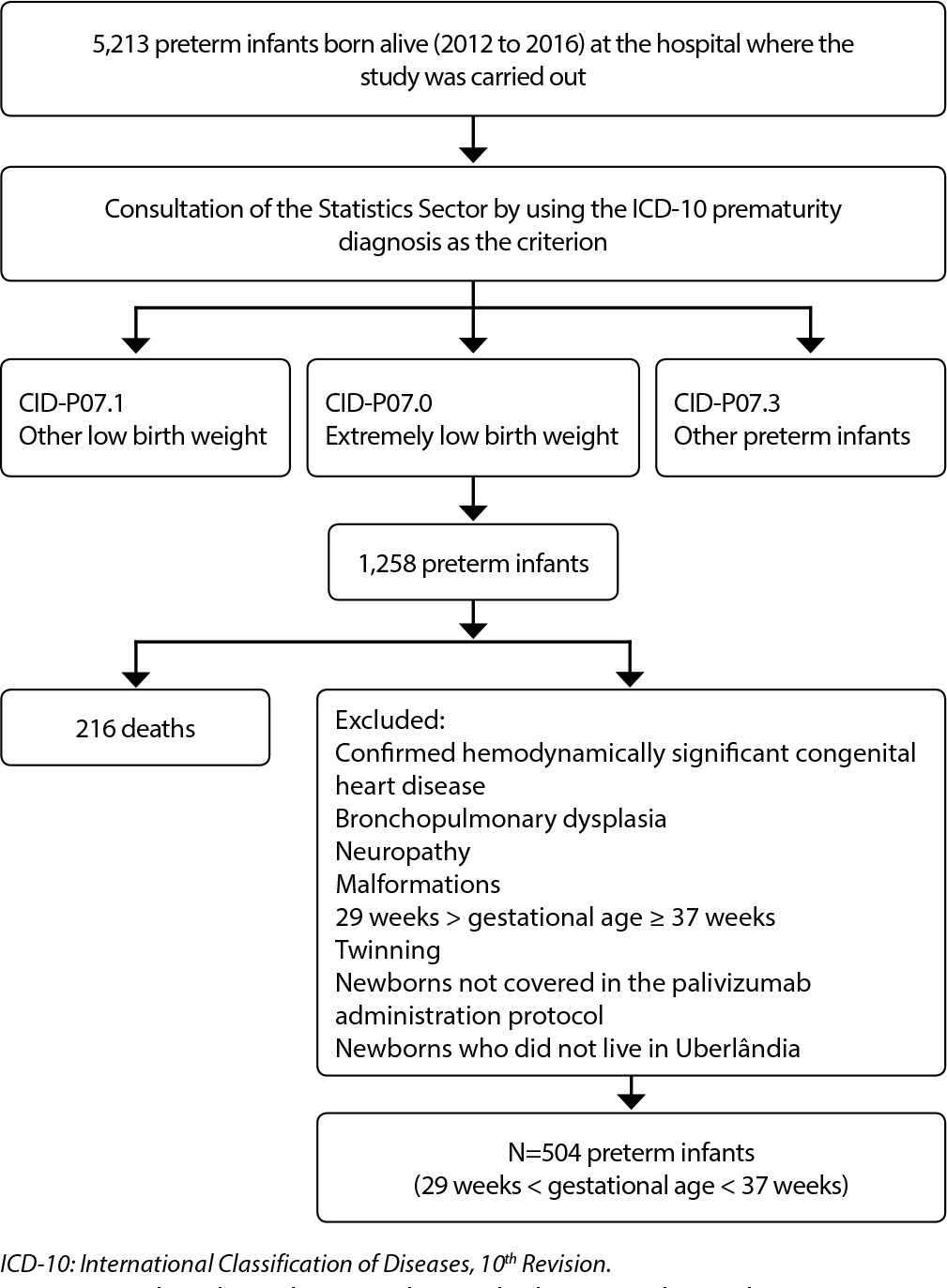
-
ORIGINAL ARTICLE12-07-2020
Sarcopenia screening in elderly in primary health care: nurse knowledge and practices
Revista Brasileira de Enfermagem. 2020;73:e20200421
Abstract
ORIGINAL ARTICLESarcopenia screening in elderly in primary health care: nurse knowledge and practices
Revista Brasileira de Enfermagem. 2020;73:e20200421
DOI 10.1590/0034-7167-2020-0421
Views0See moreABSTRACT
Objective:
Describe the knowledge and practices of the Primary Health Care nurse on sarcopenia screening in the elderly.
Methods:
Qualitative study conducted with 24 Primary Health Care nurses. The data was collected through semi-structured interviews, recorded and later transcribed. The speeches were grouped in thematic categories, later analyzed, supported by Paulo Freire’s reference.
Results:
The findings showed that the primary care nurses’ knowledge of sarcopenia screening in the elderly was incipient and fragile. This reality is reflected in a gap in practice, although some instruments already require the registration of characteristics indicative of sarcopenia, such as the evaluation of the calf circumference.
Final Considerations:
The need to train nurses to perform sarcopenia screening and to implement a promotional and preventive care plan, which will result in improving the quality of life of the elderly assisted in Primary Care, was highlighted.
-
ORIGINAL ARTICLE02-17-2020
Social network of children with cronic disease: knowledge and practice of nursing
Revista Brasileira de Enfermagem. 2020;73(2):e20180371
Abstract
ORIGINAL ARTICLESocial network of children with cronic disease: knowledge and practice of nursing
Revista Brasileira de Enfermagem. 2020;73(2):e20180371
DOI 10.1590/0034-7167-2018-0371
Views0See moreABSTRACT
Objectives:
To identify the knowledge and practice of primary care nurses about the social network approach for families of children with chronic diseases.
Methods:
Qualitative research, conducted by means of interviews with 23 family health nurses, from one municipality in Paraíba and one in Rio de Janeiro, from June to July of 2017. The data were interpreted using thematic analysis.
Results:
Social network meant institutional support offered by services outside the unit, and socioeconomic problems involved the family context. In practice, nurses find it difficult to provide comprehensive care and establish ties with families. When referring to other professionals, a weakness in the counter-referral to the family health unit is found.
Final considerations:
Some gaps were found regarding the knowledge and practice of nurses regarding the social network approach, which requires professional training to strengthen social relationships and the necessary support for families of children with chronic diseases.
-
ORIGINAL ARTICLE10-21-2019
Inclusion of mental health in primary health care: care strategy in the territory
Revista Brasileira de Enfermagem. 2019;72(6):1677-1682
Abstract
ORIGINAL ARTICLEInclusion of mental health in primary health care: care strategy in the territory
Revista Brasileira de Enfermagem. 2019;72(6):1677-1682
DOI 10.1590/0034-7167-2018-0806
Views0See moreABSTRACT
Objective:
To analyze the strategies, challenges and possibilities of the articulation between mental health and primary health care from the perspective of health managers.
Method:
Exploratory, qualitative research carried out with 28 managers of mental health and primary care. The data were collected through semi-structured interviews between July and November 2013 and submitted to thematic content analysis.
Results:
The inclusion of mental health actions in primary care made it possible, in the view of managers, to increase users’ access to the care they need. This care strategy allows the extension of care practices in the territory, with matrix support as the main tool for the implementation of this care strategy.
Final considerations:
The articulation between primary care and mental health is a powerful device for psychosocial care, but it demands a new conformation of the Psychosocial Care Centers (Caps) and primary care services.
-
06-11-2021
Prevention of facial injuries caused by personal protective equipment during the COVID-19 pandemic
Revista Brasileira de Enfermagem. 2021;74:e20201219
Abstract
Prevention of facial injuries caused by personal protective equipment during the COVID-19 pandemic
Revista Brasileira de Enfermagem. 2021;74:e20201219
DOI 10.1590/0034-7167-2020-1219
Views0See moreABSTRACT
Objective:
Develop and validate a leaflet to guide health professionals in preventive measures related to injuries caused by the use of personal protective equipment during the COVID-19 pandemic.
Methods:
For the construction of the brochure, an integrative review was carried out in the main databases. The evaluation of the leaflet was made by 59 health professionals (nurses, physiotherapists, and doctors), using the Delphi technique.
Results:
In the first evaluation cycle, the items in the brochure were considered by the judges to be “inadequate” to “adequate”; the Content Validity Index was 0.80-1.0. After the adjustments suggested by the judges were implemented, the leaflet was sent back to the second evaluation cycle, in which all items were considered “adequate”, resulting in a Content Validity Index of 1.0.
Conclusion:
The developed brochure has content validity and can assist health professionals in preventing injuries caused by the use of personal protective equipment the developed brochure has content validity and can assist health professionals in preventing injuries caused by the use of personal protective equipment.

-
ORIGINAL ARTICLE07-08-2020
Self-efficacy in elderly with type 2 Diabetes Mellitus
Revista Brasileira de Enfermagem. 2020;73:e20180980
Abstract
ORIGINAL ARTICLESelf-efficacy in elderly with type 2 Diabetes Mellitus
Revista Brasileira de Enfermagem. 2020;73:e20180980
DOI 10.1590/0034-7167-2018-0980
Views0See moreABSTRACT
Objective:
to analyze the self-efficacy of elderly with type 2 diabetes mellitus and the relationship with sociodemographic, clinical, knowledge, and attitude variables.
Method:
a cross-sectional quantitative study conducted with 256 elderly people enrolled in Family Health Strategies. Data were obtained through interviews. Descriptive statistical analysis and multiple linear regression model were performed (p <0.05).
Results:
female, 69.95-year mean age, white skin color, 4-7 years of schooling, living with a partner, retirees, low individual monthly income, 6 to 15 years of illness, Catholics, living with children (with or without spouse). The elderly’s low knowledge and negative attitude prevailed. Self-efficacy was associated with attitude and knowledge in the domains “General and Specific Diet”, “Physical Exercise” and “Blood Glucose”.
Conclusion:
self-efficacy investigations in type 2 Diabetes Mellitus management in the elderly are important and encourage treatment adherence.
-
ORIGINAL ARTICLE09-16-2019
Knowledge of nursing student on the prevention of sexually transmitted infections
Revista Brasileira de Enfermagem. 2019;72(5):1145-1152
Abstract
ORIGINAL ARTICLEKnowledge of nursing student on the prevention of sexually transmitted infections
Revista Brasileira de Enfermagem. 2019;72(5):1145-1152
DOI 10.1590/0034-7167-2017-0801
Views0See moreABSTRACT
Objective:
To identify the knowledge and self-care actions taken by nursing undergraduate students of a Federal University of the South of Brazil, against Sexually Transmitted Infections.
Method:
Exploratory qualitative study, conducted 40 interviews with undergraduate students at the beginning and end of the course. The analysis was thematic, resulting in three categories.
Results:
Knowledge about the subject is a decisive factor for self-care, and the more knowledge, the greater the prevention. The dissemination of knowledge of students at the end of the course not only influences self-care but also health promotion in the social sphere.
Final considerations:
Knowledge is important in self-care and caring for others. The dissemination of knowledge becomes evident according to the complexity of the course. Stable relationships may interfere with the use or disuse of condoms in sexual relationships, a misnomer present in today’s society.
-
REFLECTION09-29-2022
Health care of deaf persons during coronavirus pandemics
Revista Brasileira de Enfermagem. 2022;75:e20201036
Abstract
REFLECTIONHealth care of deaf persons during coronavirus pandemics
Revista Brasileira de Enfermagem. 2022;75:e20201036
DOI 10.1590/0034-7167-2020-1036
Views0See moreABSTRACT
Objective:
To reflect about the barriers experienced by the deaf population during the COVID-19 pandemic, the proposals to overcome communication barriers in health care and the role of public policies in effecting the social inclusion of deaf people.
Methods:
Reflection based on studies on health care for deaf people, the COVID-19 pandemic and public accessibility policies.
Results:
The global crisis of COVID-19 has deepened pre-existing inequalities in the world, in addition to highlighting the vulnerability of people with disabilities, including deaf. Government, institutional and social initiatives to mitigate difficulties in communicating to deaf people have been made, but they are still insufficient to guarantee protection for them in this pandemic and full inclusion in health care.
Final considerations:
Social inclusion, supported by law, and the linguistic accessibility of deaf people still need to generate broad and concrete actions so that deaf people can enjoy their rights as citizens.
-
EXPERIENCE REPORT08-19-2019
PLISSIT model: sexual counseling for breast cancer survivors
Revista Brasileira de Enfermagem. 2019;72(4):1109-1113
Abstract
EXPERIENCE REPORTPLISSIT model: sexual counseling for breast cancer survivors
Revista Brasileira de Enfermagem. 2019;72(4):1109-1113
DOI 10.1590/0034-7167-2018-0525
Views0See moreABSTRACT
Objective:
Reporting the experience of use of the PLISSIT model as tool for the nursing care of breast cancer survivors with sexual dysfunction.
Method:
case study developed from January to August 2017, in the outpatient mastology clinic and sexuality service of a maternity in Fortaleza, Ceará, Brazil, with 15 breast cancer survivors.
Results:
sexual counseling sessions were conducted using the PLISSIT model to address sexual issues, highlighting the particularities of women who experience survival after the treatment of breast cancer.
Final considerations:
the model used in the practice of nursing care is customary and allows identifying issues experienced by women, as it has easy availability and practicality for use by nursing professionals, helping to address sexual matters with greater tranquility.
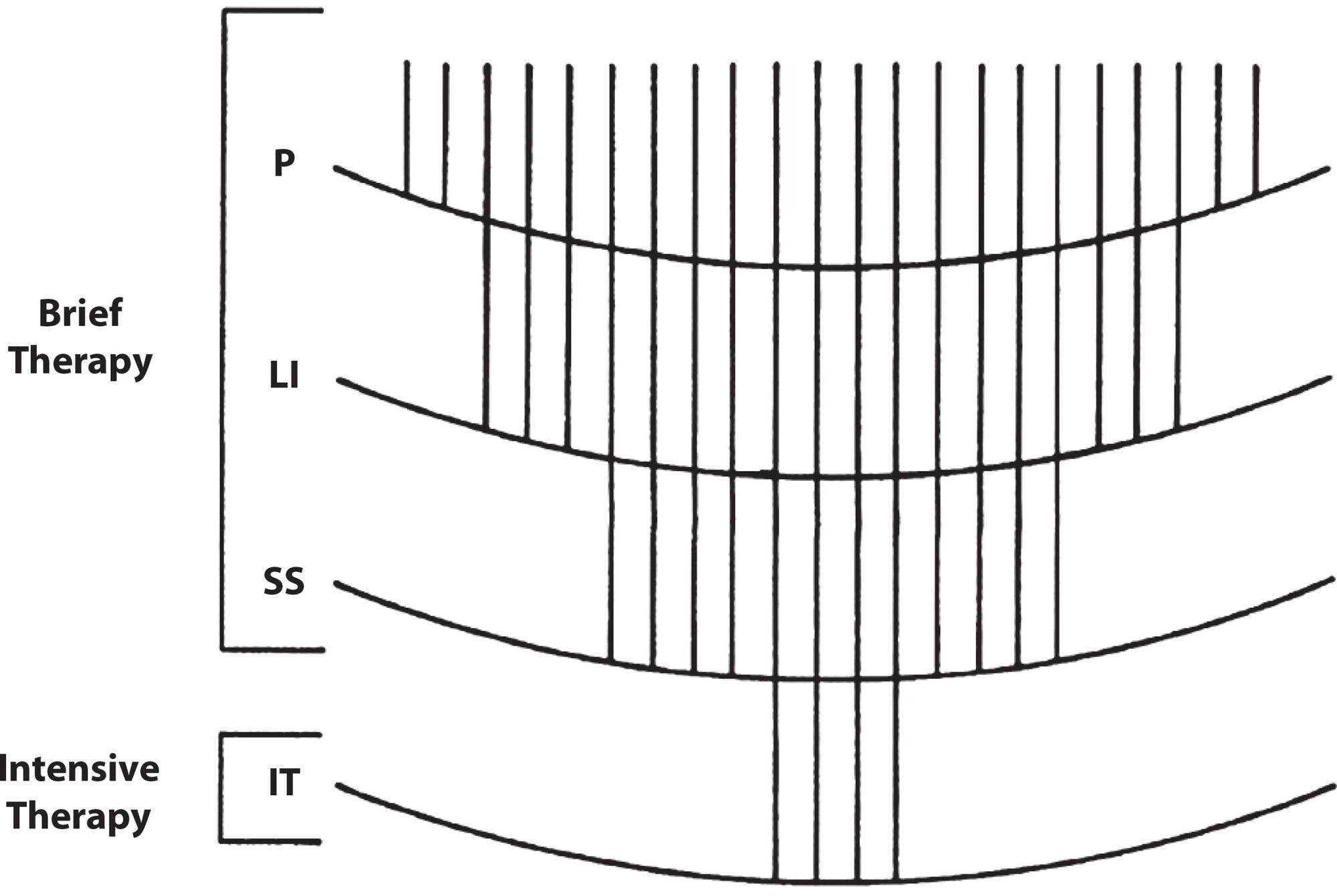
Search
Search in:
Nuvem de Tags
Adolescente (85) Atenção Primária à Saúde (239) COVID-19 (91) Criança (91) Cuidados de Enfermagem (269) Educação em Enfermagem (151) Educação em Saúde (139) Enfermagem (930) Enfermagem Pediátrica (86) Estudantes de Enfermagem (77) Estudos de Validação (131) Família (87) Idoso (208) Promoção da Saúde (99) Qualidade de Vida (104) Saúde do Trabalhador (86) Saúde Mental (145) Saúde Pública (82) Segurança do Paciente (150) Tecnologia Educacional (100)



